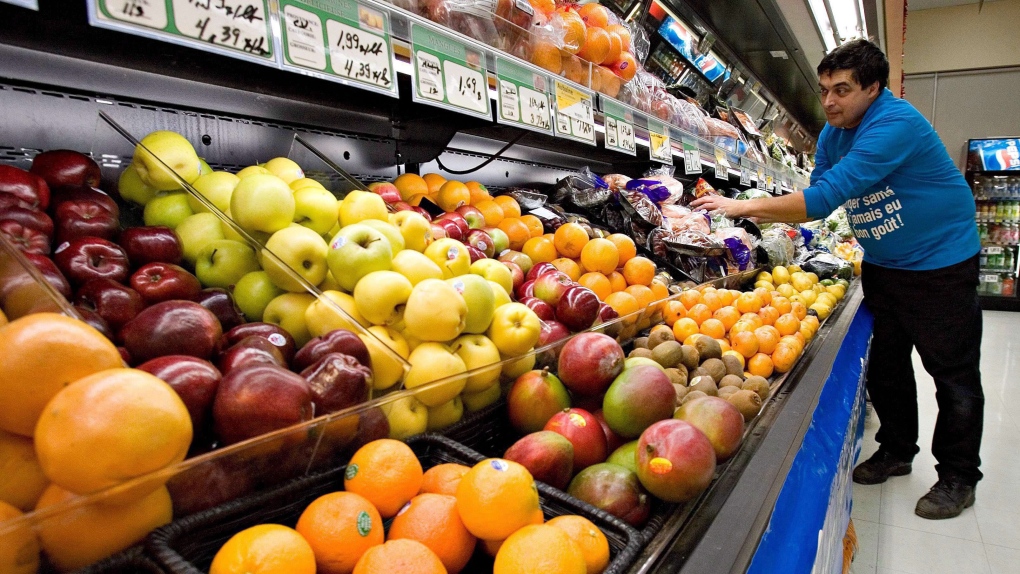TLDR; climate change, Russia, supply chain not recovered, labor shortages; more price increases expected :/
This is such a dumb headline.
The rate of price increases slowing doesn’t mean that prices go down. It means that prices increase more slowly.
ETA: we aren’t experiencing deflation. And we probably don’t want to.
doesn’t mean that prices go down
But, to be fair, they are going down. The price I can get as the farmer is 30-50% of what it was last year.
You’re still paying more at the grocery store because what you are eating now, I sold you last year (maybe even the year before). Turns out people don’t like surprises when it comes to food, and want to ensure that we grow enough to feed them, so they generally buy it years in advance.
Your price might go down, but that’s because you have the least amount of leverage. Same applies to customers, and to any smaller entity in the supply chain.
I’d also note the LCL, Empire and Metro didn’t hesitate to push on supplier increases, but also didn’t hesitate to raise resale at the same time. Most of them are seeing increased margins and they’re all seeing higher profit, which, if we had a fair tax structure, wouldn’t happen.
I work in distribution. Other than select contract negotiations at very high volumes, I can’t think of the last time I saw a price decrease go through, though I will say our fuel surcharge at least isn’t going up. So the rate of increase is slowing, but resale prices, by and large, are not going down. At best, this is the “new normal”
I can’t think of the last time I saw a price decrease go through
Somewhere in the mid-2010s, I’d imagine. Prices have been relatively stable or increasing since, save recently. It’s still a little early for the rest of the chain to start to feel it, but it will come. It always does.
In fact, with respect to the economy at large, only once in history has a period of high inflation not been quickly followed by deflation – and that period was unique in that, unlike the usual supply shocks, the driving force – a sudden, sharp rise in the number of consumers (i.e. the boomers coming onto the scene) – never really went away.
It all takes time, though. Nothing happens in a day.
Agreed! …and you made a smart observation about prices.
All of those reasons are BS if grocery stores are still posting record profits.
Edit: grammar
Because retailers took advantage of inflation to push profits even higher, especially one specific retailer who has a vertical monopoly in the grocery sector, of which they’ve been caught and convicted of using to fix the prices of bread in the past.
They’re still high because food is a staple, a necessity. Competition can’t spin up in several months. And competition certainly can’t compete with this existing farm to grocer system.
These prices are never coming down. They’d keep going higher if people weren’t so angry they were stealing instead.
The best protest is to not shop there.
I know. Sounds stupid.
Farmers stands. Farm to table markets. Farmer’s markets.
Call farms and see if you can place orders. They need larger orders? Start ordering with friends, neighbours, family.
This stuff is grown in our backyard, and we are paying for some guy to buy it to sell to some other guy for a huge mark up so we can pay even more for no reason.
https://beta.ctvnews.ca/national/business/2023/4/5/1_6344721.amp.html
Tale as old as time. Prices go up. CEO pay goes up. Wages go down. It’s a real head scratcher.
And a tale that has been told throughout the ages, yet, despite that, Canadians still somehow think they need to go to university and get a job instead of using that capital to become the CEO of their own company. It is a real head scratcher, indeed.
How do I not shop there when I only have 2 options. Do I just stop eating ?
Well, you kind of accept that you don’t have options for anything when living in the extreme north of Canada.
The remaining ~99% of Canadians live amongst farmers, though. We’ve built our largest cities on literally the best farmland in the country to ensure that the food is right there. They have thousands of options.
What do you mean 99% of Canadians love amongst farmers . The vast majority of Canadians live in the city no where near a farm . I live in NB so definitely not extreme north .
It’s the market that controls the prices. Many shops won’t rise prices because they would lose customers, if many others don’t.
But after an agreed price rise, it’s a different situation. It takes more time to sell cheaper, because the shops want to pretend that stuff is expensive just a bit longer.
Just have some patience and try to avoid the expensive stuff, as much as you can for some time. The biggest risk for shops is that someone finds alternatives and actually never again buys the previous product. They’ll panic and prices will fall drastically.
Just have some patience
Lmfao, as if the companies making record profits are suddenly going to stop doing what they’re designed to do (constantly keep breaking those records), if we just give them some time…
My car stopped accelerating. Why am I still going so fast?
Good analogy. Inflation is a rate of change.
Hopefully that wall will slow us down!
I think I see a bottomless pit ahead if we miss the wall. :-)
so why are grocery prices still so expensive?
Capitalism.
“Inflation” is just the polite way of saying “if billionaires find out you’ve still got money, they’ll fuck you out of that too”.
It’s apparently why we can’t just raise wages or give useful amounts of welfare to the people who need it. We have to sneak the money to people, lest the billionaires find out.
No matter what the inflation rate prices will not go down, for prices to go down you need deflation which is not likely to happen. Prices will always go up, it’s just the speed of which they go up that changes.
We saw deflation as recently as 2020. Prices do not always go up.
Moreover, every single high inflationary period in history, save one time, has seen deflation occur soon after. Why do you think this will be the second outlier, especially when the driving forces are closer to every other time and quite unlike that one unique time?
To be fair, 2020 was a little weird.
It was, but we also saw deflation in 2009. It is less common for us to see than inflation, to be sure, but it is far from something that never happens. On average, we experience it about once every decade. No doubt it will be twice this decade by the time we reach the end.
If you’re taking 2 steps forward and 1 step back, you’ll still get where you’re going. For deflation to be a thing we’d need 2 steps back to every step forward. Otherwise it’s inflation with pauses.
TLDR; climate change, Russia, supply chain not recovered, labor shortages; more price increases expected :/
You list all the reasons but the one that actually matters and is responsible for all of the others: capitalism.
Why do people find it so hard to say/admit?
Under capitalism we don’t produce food for the purpose of feeding people, we produce it to make a profit. If a person can’t afford to buy food, we let the person starve and the food rot on the shelf.
Back when I worked in a grocery store one of my regular tasks was processing unsalable product. There is… a lot that gets thrown away. And from what I hear it is much worse in other parts of the world.
I used to work in cold storage distribution for Loblaws. There is even so much more thrown out before it gets to the store, we had a giant bin that would get emptied once our twice a week. Someone eventually organized something to donate discarded produce to the local shelters and the zoo I think so at least it wasn’t going to waste, hopefully they are still doing that.
There are some exceptions, but the vast majority of farms in Canada, and around the world, operate under a socialist model – they are owned by the workers.
What you describe isn’t a feature of capitalism, it is a feature of human nature. Someone giving up their life to grow food wants something in return. People don’t like having to give up their life, so if you have nothing to offer in return, people don’t take too kindly to that.
They actually do address it. By handwaving it away with practically no analysis. This article might as well be paid for by the grocery industry.
BIG GROCERS DICTATING FOOD PRICES Many Canadians have pointed the finger at big corporations for how expensive groceries have become over the past few years, but Huggins said the issue of high food prices is a bit more complex.
In Canada, five retailers — Loblaw, Sobeys, Metro, Walmart and Costco — control an estimated 80 per cent of the grocery market share, according to a 2021 study from the federal government.
As Huggins pointed out, these companies make up an oligopoly, which is a market dominated by a small group of suppliers, so they are able to exercise their power in the market and have “very protected profit margins.”
However, he said there hasn’t been much evidence of them abusing their power in the market to drive up food prices in the last two years.
“In the early days of the pandemic, there was some jockeying for price increases, mostly because there were big supply disruptions happening, but we haven’t seen an enormous amount of it,” he added.
“They’ve certainly been able to prevent their profits from coming down, but I haven’t seen a lot of exploitative size numbers.”
Oh, it’s a TLDR of the article, not my opinion.
The grocery stores record profits make it obvious they have more than enough room to absorb a lot of the upstream pressure for price increases. They don’t feel compelled to do so in any way though :/
Sorry, I should have been more clear, my criticism isn’t of your TL;DR, it’s of the fact that it didn’t include capitalism (which I understand is because the article doesn’t, which is what I’m criticising).
The margins have grown considerably in the past year, yes, but they also know what’s coming. Make hay while the sun shines.
Came here to say the same. Greed.
A lower Inflation rate doesn’t equate to lower prices. It equates with those prices not rising as much and as fast…but as long as the rate is positive, those prices are still going up.
True, except the rises so far have been much larger than inflation warrants, with the expectation for a correction at some point, which is what the article discusses.
Until the conflict in Ukraine is resolved, I’d expect those prices to still be up. Wheat and oil being impacted in that conflict have major repercussions across the supply chain across the world.
Wheat today is only worth half of what it was last year.
I expect the prices to still be up only because it takes a while to work through the system. Similarly, it took a while after farm gate prices started climbing over the past several years before prices at the store started going up. Give it another year and things will look quite different, even if the Ukraine conflict persists.
Corporate profits
Economists say there are a number of factors driving up food prices
GREED. The answer we were looking for is greed. Thanks for playing.
A more helpful question is to ask why prices are increasing when Loblaws and company have been making record profits since 2020.
I mean, I know why, but
For those who don’t know why:
To preface, there are two sides to every transaction: Something being offered, and something being traded in kind. Exchanging parties must feel that both sides of the transaction are of equal value in order to see a transaction carried out. The unit of measure used to determine where that equalization point is found is known as price.
On one side of the transaction, the value of what is being offered had been declining in value at a rate not seen in a long time. This means that it takes more of that thing to equalize the other side of the transaction. COVID factors has lead people to not see this thing as being as valuable as they once did. While that decline has pretty much settled down now, it does partially explain why prices have risen up to this point.
On the other side of the transaction, the value of what is being offered has been increasing in value at a rate not seen in a long time. This means that it takes less of that thing to equalize the other side of the transaction. The Ukrainian conflict suggesting that famine is a real possibility has reminded people that they shouldn’t take this thing for granted, and as such they now consider it more valuable. This explains the remainder of the price growth.
As a farmer we haven’t even seen the beginning of food inflation. The entire country and much of the world is in drought, and we’re only entering this El Nino cycle.
I sold all my animals and my crops are a wash. Drought has crushed yields over a vast area of Canada’s agricultural land. Combining the other factors at play such as war between two massive grain producers, there’s a chance that global food demand could actually outstrip production this year, for the first time since the start of the Green Revolution.
With that said, processors and middlemen are definitely grabbing the large portion of the increased value of food at the stores. Cattle prices are up but nowhere near the extent that beef has risen, and will soon plummet as animals are dumped on the market for lack of feed. What won’t plummet is the consumer price of beef, I can almost guarantee it. And I shudder to think of what grain and bread prices could be by the end of this year. Very glad to have a freezer of meat, huge garden, a good wheat grinder and bins of grain that would last my family decades.
we’re only entering this El Nino cycle.
El Niño typically brings rain. In fact, as you know being a farmer, several weeks ago there was drought panic in the market – but with that cycle starting to set in the rains finally came and the prices came tumbling down again thereafter.
Commodity prices are 30-50% of what they were last year. The grocer price remains high only because it takes a while to work through the system. Next year things will look quite a bit different.
Drought has crushed yields over a vast area of Canada’s agricultural land.
We’ve mostly recovered here in Ontario, but true that things don’t look so great in the west. However, the markets aren’t terribly concerned. Wheat, for example, is down 10% in just a couple of weeks. Canada isn’t that significant of a producer in the grand scheme of things, really.
What won’t plummet is the consumer price of beef, I can almost guarantee it.
Well, it is certainly volatile right now. The dumping is visible as you can see beef being sold for half the price of the day before if you go to the store at the right time, and then it jumps back up soon thereafter. But, overall, beef lags corn. It will take several years to work its way through the system, just like in 2013. Eventually it will return. It always does. We’ve been here a million times before.
And I shudder to think of what grain and bread prices could be by the end of this year.
All us farmers would love to go back to last year’s market, I’m sure. But for the consumer, the rains came at just the right time in the most important places, so things are going to almost certainly going to become cheaper still.
The cure for high prices is high prices.
The person you’re replying to is a very interesting person indeed. They’re a farmer, an electrician and looks like a fairly knowledgeable, low level programmer as well.
Sounds like every farmer. Who knew they were all so interesting?
The amount of things you need to be able to do as a farmer would astound everyone that thinks farmers are yokels. Run a multi-million dollar business and you need to learn things, who knew?
Not to mention that, save the guilded few who had the farm given to them, one needs a lucrative career to fund their farming habit, so you’re going to find a lot of farmers who also work as electricians, programmers, doctors, lawyers, etc.
the prices came tumbling down again thereafter.
Not from what I’ve seen. Canola hit another spike a couple weeks ago pulled up by the general veg oil complex, we sold a few loads then, there is some of the usual seasonal drop heading into harvest now. Canola is also driven by demand from crush plants coming online across Canada. Barley and oats are doing well too, accounting for harvest pressure. Which does mean beef will generally stay up based on feed prices that seem baked in for a while.
With that said, processors and middlemen are definitely grabbing the large portion of the increased value of food at the stores
They always have. But the difference between the farm gate price and the store shelf price has got even wider in the last few years.
It’s one of the main reasons why my brother and I didn’t take over the family farm when it was an option.
because groceries price increases were because of companies getting rich, and not inflation.
/story
Yep. It’s an oligopoly
Inflation is not prices, it’s a rate of increase of prices. Even if Inflation is at 0%, prices won’t decrease, 0% mean prices stability. To see prices diminish, Inflation would need to be negative, in that case it’s depression.
Actually deflation, depression is a reduction in the total throughput of a country for a prolonged period (not stational).
Inflation is not prices, it’s a rate of increase of prices.
Inflation attempts to measure the decreasing value the of currency as observed over time. The change in price across a certain basket of goods is the proxy used to determine that.
Even if Inflation is at 0%, prices won’t decrease
All else equal, a decline in value of the currency means that price will rise. However, there are two sides to every transaction. The thing on the other side may also decrease in value. If that other thing decreases in value faster than the currency, then it is possible for inflation to be >=0% and for the price to still fall.
That TL,DR is missing the actual reason… Extended pandemic profiteering to “get even” with consumers for staying inside for half a week and not shopping at their fullest potential.
Capitalists are quoted as saying, “we will be made whole, and then some, and you’ll apologize for what you did to us.”
What is Late-stage Capitalism, Alex?















